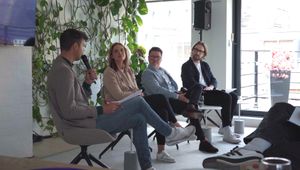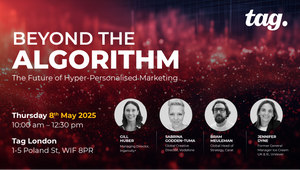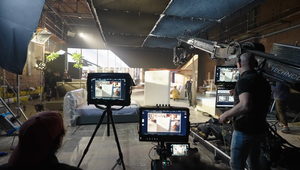
Dispatches from Tag in Cannes Where ‘Tech-celleration’ Was Top of the Agenda

Another Cannes Lions is behind us but this year’s festivities may have been the biggest ones to date with attendees embracing full in-person experience while musicians like the Foo Fighters made it a stop on their way to another festival, Glastonbury.
Tag - an omnichannel content production partner - used this year’s festival to host roundtables to discuss the future of content and creativity. . .
High on the agenda was, unsurprisingly, AI. As excitement and concerns about its current and future use spreads, it’s clear there is huge speculation about what kind of changes we should brace for. Present at the two roundtables were a selection of Tag’s senior leaders as well as a host of the industry’s most respected voices: Andria Vidler, CEO of Tag EMEA; Deepti Velury, Tag’s COO; Helen Weisinger, Tag’s CMO EMEA; Ipsos’ global CEO Ben Page and head of creative excellence, Eleanor Thornton-Firkin, St. Luke’s joint CCO, Richard Denney, and Gill Huber, managing partner, Oystercatchers, as well as a host of clients.
Research from Ipsos, which introduced both discussions, shows that currently 81% of people think that social media companies have too much power in people’s lives and wield too much influence in the world. Interestingly, the same Ipsos poll found that a lot of people are feeling that the world is changing too fast and AI is only likely to accelerate the rate, further adding to the feelings of discontent people have towards new technologies.
Ipsos also found that 60% think tech progress is destroying their lives - perhaps the most damning finding of them all. Cited were worries about what AI will do to relationships, jobs, and future earning potential. The consensus was that findings like these shouldn’t be ignored or ridiculed especially when we know that the introduction of AI into workplaces is ongoing and will accelerate over the next year. Instead, this information can serve as a starting point for the introduction of AI into companies, like spending time on conversations about the implementation of the tech and making plans to, where necessary, upskill individuals.
Tag’s Deepti Velury says that “she’s an optimist” in general so for her AI is a way to optimise creativity and bring multiple benefits to clients since AI presents an opportunity to positively transform organisations when implemented correctly. Deepti posited that this moment is “the cusp of the creative industry aligning with the tech industry” and, for Tag, this means finding solutions that increase output while maintaining quality standards, reducing errors and costs, at scale. AI is certainly looking set to reduce pain points by automating briefing processes and delivering content personalised for all channels, but creatively, there’s also a lot of opportunity though it does raise questions about training people to be able to use it effectively and in a way that maximises creativity. “It’s an opportunity to transform our organisation,” says Deepti.
Richard Denney is likewise excited about the potential for agile creativity that automation can bring to smaller teams like his, helping creatives have more impact across new client pitches and existing work. Richard expressed the sentiment that AI needs to be a tool in an arsenal of many, not a replacement for people and their creativity.
The legal aspect was on everyone’s mind. Multiple attendees were concerned with the possibility of AI reproducing existing biases when it comes to gender, race, class, and so forth, considering that the tech learns on everything that’s come before. It’s something that anyone implementing AI tools needs to be vigilant of to ensure that biases are monitored for. Additionally, since AI cannot create original content, we need to ensure that it doesn't use copyrighted ideas and original materials to present as its own. Ben Page was explicit in how, right now, AI simply reflects our world so a search for an engineer will return majority images of men while a search for images of sales assistance will be mostly of women, for example. In a way, then, AI lacks imagination and intentionality, which is why the human touch is essential to ensure that we’re using AI to direct and shape the future we want to live in.
The strongest idea that emerged - and one everyone was supportive of - was that the industry can’t think about AI in binary terms; the truth is absolutely somewhere in the grey area.
A lot, maybe too much, of the current thinking is imagining possibilities that are either far off or might never come into fruition, like utilising AI to create original ideas or work as an integrated part of a creative team. In its infancy, the applications are going to be far less sexy - though none the more appealing - providing greater efficiencies, making budgets go further, and easing workloads by automating high volume mundane tasks.
Ultimately, everyone in the industry needs to remember that we’re all in the learning phase with AI right now. Learning means trying new things, playing out different scenarios and necessarily failing to best understand AI’s capabilities and limitations. Innovation is borne out of failure - now is the time to test the many ways AI can be used, integrated, and introduced to people. Let’s not forget those findings from Ipsos; AI is causing anxiety but maybe that’s because it’s spoken of either in a utopian or a dystopian way. The reality is always more mundane, especially considering how AI already helps us in everyday life, whether that’s through predictive text or translation apps. Being realistic about AI, its uses, and its future implementation will help to alleviate anxieties while experimenting and learning means that more people can start benefiting from it right now.















